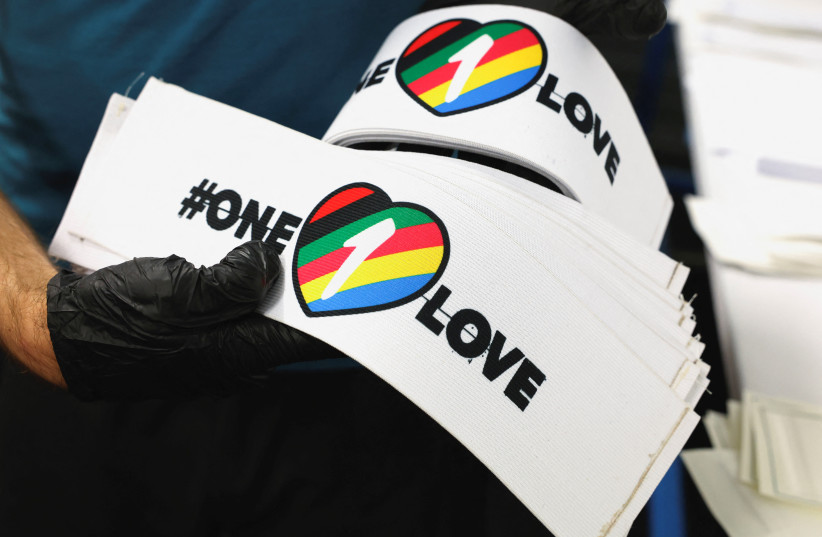Several recent videos have allegedly shown Qatar cracking down on people who support protests in Iran. This comes as reports also say Iran is targeting its own soccer players who are competing in the World Cup.
In addition, the targeting of critics of Tehran is in line with other controversies in Doha, such as the suppression of gay rights and attempts to eliminate pride flags and pride armbands during the international sporting event.
A video posted Monday on social media appeared to show five women with clothing marked “police” and “security” escorting a sixth woman who was wearing a “Woman, Life, Freedom” shirt during the World Cup events.
“Iranian woman wearing a ‘Women, life, freedom’ T-shirt was removed from a World Cup stadium by Qatari officials,” CNN contributor Frida Ghitis posted. “Why is FIFA allowing this level of repression? Why was Qatar allowed to host the event?”
Qatar increases suppression, cracking down on Iran critics, rainbow attire
Doha appears to be increasing its suppression of freedom of expression, specifically targeting critics of Iran’s regime and anyone who has garments or decorations that look like rainbows. Iran International recently said a tape exists of Islamic Revolutionary Guard Corps members discussing how to silence dissidents during the sporting event. Tehran appears concerned about the presence of dissidents or Iranians using the sporting event to exercise freedom.

“The families of Iran’s World Cup soccer team have been threatened with imprisonment and torture if the players fail to ‘behave’ ahead of the match against the USA on Tuesday, a source involved in the security of the games said,” CNN reported.
“Following the refusal of Iranian players to sing their national anthem in their opening match against England on November 21, the source said that the players were called to a meeting with members of the [IRGC],” the report said.
It is difficult to know if the videos of people being detained or harassed in Qatar due to their opposition to Iran’s regime reflect a wider crackdown. Tehran and Doha have already enjoyed warm relations, and this is important because it contrasts with Iran’s colder relations with Saudi Arabia.
As such, Qatar not only needs Iranian support, but both the countries share other interests. The authoritarian regimes in Doha and Tehran work with Hamas and Turkey, which backs Hamas and has also backed Qatar. Together, these countries work with China and Russia.
HOWEVER, Doha is also a keen partner of the West and hosts a US military base. As such, Qatar seeks to play both sides. It has hosted not only Hamas and other extremists over the years, but also the Taliban. By hosting the extremists, Doha then becomes a conduit for “talks” that help empower groups such as the Taliban.
Clearly, these far-right religious theocratic groups tend to be homophobic and against things such as the pride flag. Pro-Qatar media have said that Doha is merely demanding respect for its “culture” in terms of issues relating to gay rights.
“LGBTQ+ rights activists and campaigners have condemned FIFA’s threats to impose sanctions on players who wear OneLove armbands at the World Cup in Qatar,” The Guardian reported last week. “England, Wales and five other European nations have confirmed their players will not wear the armband, saying the football governing body had made it clear their captains could be booked or forced to leave the pitch if they did so. The move was criticized by LGBTQ+ groups, with mixed reaction as to who was to blame.”
It appears that what began as Doha demanding respect for its “culture,” and claims that critique abroad was discrimination against Qatar, is now shifting to a more reactive policy by the World Cup host, in which dissidents are being harassed. This includes targeting protests against the Iranian regime, and it also may be linked to increased incidents of hostility against Israeli media.
In the last several days, there have been several negative interactions between Israeli media representatives and sports fans in Qatar. It’s not clear if this is authentic behavior or if Doha is quietly letting it be known that protesting Israel should be supported as a way to distract from other problems in the hosting country.
Harassment of those who wear shirts that say “Women, Life, Freedom” appears to be increasing. The video making the rounds on Tuesday showed a man being accosted by officials wearing the same police “security cell” as those who harassed the woman in the previous video, who also wore the shirt about.
Qatar’s attempts to crush dissent are going far beyond going after protesters or dissidents; it is targeting things such as arm bands and shirts. Even the colors of the rainbow can get people in trouble, according to posts on social media.
